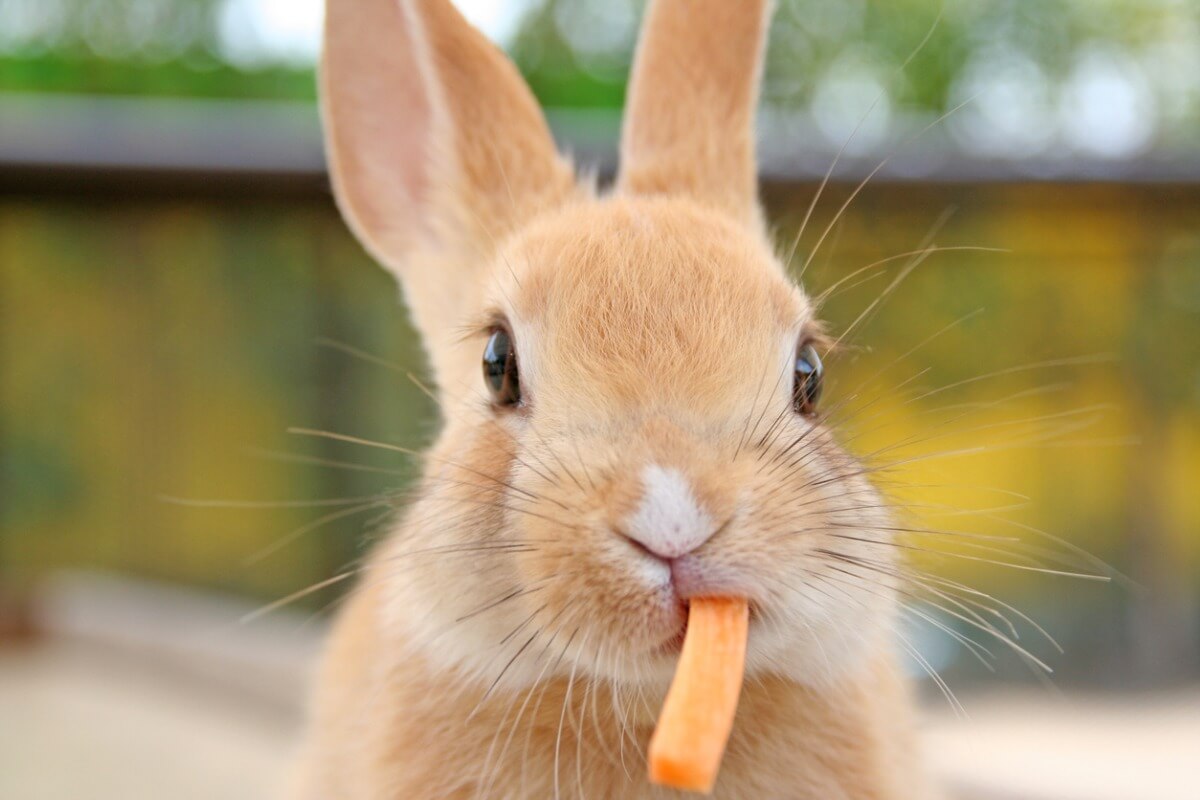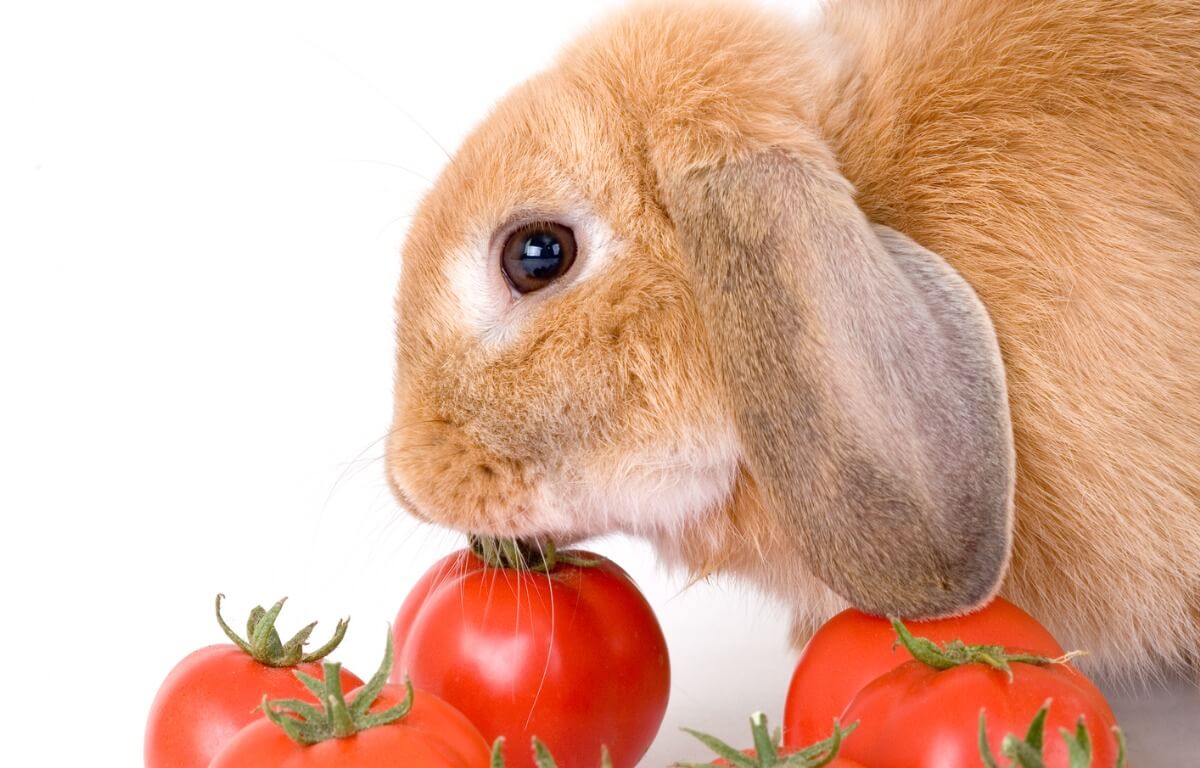The Best Treats for Rabbits


Written and verified by the biologist Cesar Paul Gonzalez Gonzalez
Rabbits also have a predilection for certain foods, which is quite helpful when wanting to give them treats. These tend to encourage the trust that exists between the owners and the pet. However, it’s important to emphasize that under no circumstances should they interfere with their daily diet.
To avoid any type of problem with the rabbit’s nutrition, you need to choose its food well, and its treats too. Keep in mind that any inadequate variation in nutrients can cause serious health problems, so this issue shouldn’t be taken lightly. Keep reading this space and learn about the best treats for rabbits.
A rabbit’s diet
A rabbit’s diet is based on the consumption of large amounts of hay, combined with various vegetables and a small ration of commercial feed. This diet is the only one capable of maintaining their digestive health, since the fiber helps their intestinal transit and promotes the absorption of nutrients.
It’s true that rabbits love sweet flavors and are fascinated by different types of fruits. However, when they consume this type of food they often tend to gain too much weight, which leads to obesity problems. In addition, over time they become picky and may even refuse their food if it doesn’t contain these delicacies.
This means that there are certain foods that rabbits love, but that they can’t consume on a continuous basis. Therefore, it’s preferable to use them as an infrequent type of reward in their diet. This won’t only protect your pet from health problems, but will also strengthen the relationship between the two of you.

The best treats for rabbits
Treats are the best tools at hand for interacting with and training pets. In fact, there are a lot of commercial options sold in specialty stores, but not all of them are suitable for their health. In the specific case of the rabbit, the best rewards should be natural and contain herbs, cereals, vegetables, or fruits.
It’s best to avoid the use of commercial treats that are in the form of bars, cookies, or tablets, as they usually come with added sugar. As a general rule, the only sweet food they can consume are fruits. Of course, this should be in limited quantities – be careful not to exceed their normal portions. Some of the most common options are as follows:
- Apples (without the seeds)
- Bananas (in very limited amounts)
- Grapes (in very limited amounts)
- Papaya
- Pineapple
- Peach
- Pear
- Raspberries
- Strawberries
- Carrots (not a fruit, but can also be used as a reward).

Experts state that it’s best to avoid using commercially sold combinations of cereals. This isn’t because it’s wrong to feed this type of food to rabbits, but because they contain some seeds that could wreak havoc on their stomachs.
Can you make homemade treats for rabbits?
If you’re very fond of your pet, you may want to try making some homemade treats for them. In fact, there are several recipes and one of the most popular is carrot cookies, which are prepared with flaked oatmeal, wheat flour, grated carrot and water. The procedure is simple, just mix the ingredients in equal parts and stir them until a dough is formed.
Finally, with the mixture try to create several round balls and place them in a non-stick pan. Bake them for about 15 minutes at a temperature of 180 degrees Celsius (250 Fahrenheit) and let them cool for a couple of hours. The final consistency is excellent for the rabbits, as its hardness allows the teeth to wear down and the carrot provides the sweet flavor they love so much.
This recipe can be used as a base for other types of cookies with different ingredients. Just be sure never to use sweet additives such as honey or sugar. Although rabbits are able to tolerate certain amounts of these sweeteners, their digestive system suffers, and it could cause intestinal problems.
How many treats can I give a rabbit?
The general recommendation is that rabbits consume no more than 3 or 4 servings a week. However, each portion should be small and not exceed one tablespoon per day. Keep in mind that rabbits have their own tastes and not all options are to their liking, so try different types of treats to find the most suitable one.
Remember that the weight of rabbits is a very important issue in their nutrition. Therefore, they should be weighed regularly to detect any abnormal increase that may cause them to become obese. If they weigh more than 2 kilograms, you’ll need to reduce or eliminate treats, and readjust their overall diet. On the contrary, if they weigh less than 1 kilogram, go to your veterinarian to check out their situation.
As you can see, not everything sold in pet stores is suitable for your rabbit. So, be very careful the next time you go in search of food or treats. Always opt for food of natural origin and don’t hesitate to ask a professional if you have any questions.
Rabbits also have a predilection for certain foods, which is quite helpful when wanting to give them treats. These tend to encourage the trust that exists between the owners and the pet. However, it’s important to emphasize that under no circumstances should they interfere with their daily diet.
To avoid any type of problem with the rabbit’s nutrition, you need to choose its food well, and its treats too. Keep in mind that any inadequate variation in nutrients can cause serious health problems, so this issue shouldn’t be taken lightly. Keep reading this space and learn about the best treats for rabbits.
A rabbit’s diet
A rabbit’s diet is based on the consumption of large amounts of hay, combined with various vegetables and a small ration of commercial feed. This diet is the only one capable of maintaining their digestive health, since the fiber helps their intestinal transit and promotes the absorption of nutrients.
It’s true that rabbits love sweet flavors and are fascinated by different types of fruits. However, when they consume this type of food they often tend to gain too much weight, which leads to obesity problems. In addition, over time they become picky and may even refuse their food if it doesn’t contain these delicacies.
This means that there are certain foods that rabbits love, but that they can’t consume on a continuous basis. Therefore, it’s preferable to use them as an infrequent type of reward in their diet. This won’t only protect your pet from health problems, but will also strengthen the relationship between the two of you.

The best treats for rabbits
Treats are the best tools at hand for interacting with and training pets. In fact, there are a lot of commercial options sold in specialty stores, but not all of them are suitable for their health. In the specific case of the rabbit, the best rewards should be natural and contain herbs, cereals, vegetables, or fruits.
It’s best to avoid the use of commercial treats that are in the form of bars, cookies, or tablets, as they usually come with added sugar. As a general rule, the only sweet food they can consume are fruits. Of course, this should be in limited quantities – be careful not to exceed their normal portions. Some of the most common options are as follows:
- Apples (without the seeds)
- Bananas (in very limited amounts)
- Grapes (in very limited amounts)
- Papaya
- Pineapple
- Peach
- Pear
- Raspberries
- Strawberries
- Carrots (not a fruit, but can also be used as a reward).

Experts state that it’s best to avoid using commercially sold combinations of cereals. This isn’t because it’s wrong to feed this type of food to rabbits, but because they contain some seeds that could wreak havoc on their stomachs.
Can you make homemade treats for rabbits?
If you’re very fond of your pet, you may want to try making some homemade treats for them. In fact, there are several recipes and one of the most popular is carrot cookies, which are prepared with flaked oatmeal, wheat flour, grated carrot and water. The procedure is simple, just mix the ingredients in equal parts and stir them until a dough is formed.
Finally, with the mixture try to create several round balls and place them in a non-stick pan. Bake them for about 15 minutes at a temperature of 180 degrees Celsius (250 Fahrenheit) and let them cool for a couple of hours. The final consistency is excellent for the rabbits, as its hardness allows the teeth to wear down and the carrot provides the sweet flavor they love so much.
This recipe can be used as a base for other types of cookies with different ingredients. Just be sure never to use sweet additives such as honey or sugar. Although rabbits are able to tolerate certain amounts of these sweeteners, their digestive system suffers, and it could cause intestinal problems.
How many treats can I give a rabbit?
The general recommendation is that rabbits consume no more than 3 or 4 servings a week. However, each portion should be small and not exceed one tablespoon per day. Keep in mind that rabbits have their own tastes and not all options are to their liking, so try different types of treats to find the most suitable one.
Remember that the weight of rabbits is a very important issue in their nutrition. Therefore, they should be weighed regularly to detect any abnormal increase that may cause them to become obese. If they weigh more than 2 kilograms, you’ll need to reduce or eliminate treats, and readjust their overall diet. On the contrary, if they weigh less than 1 kilogram, go to your veterinarian to check out their situation.
As you can see, not everything sold in pet stores is suitable for your rabbit. So, be very careful the next time you go in search of food or treats. Always opt for food of natural origin and don’t hesitate to ask a professional if you have any questions.
All cited sources were thoroughly reviewed by our team to ensure their quality, reliability, currency, and validity. The bibliography of this article was considered reliable and of academic or scientific accuracy.
- Royal Society for the Prevention of Cruelty to Animals (2022) What is a healthy food diet for pet rabbits?. Recuperado el 8 de marzo de 2022, disponible en:https://www.rspca.org.uk/adviceandwelfare/pets/rabbits/diet
- Animal Welfare Association. (2017) RABBIT NUTRITION. Recuperado el 8 de marzo de 2022, disponible en: https://awanj.org/wp-content/uploads/Rabbit-Handout-05-Rabbit-Nutrition.pdf
- Smith, M., Meehan, C., MA, J., Hisakawa, N., Dasher, S., Camarillo, J. & Techanun, J. (2009). Rabbit Nutrition: What You Need to Know. Rabbits: From the Animal’s Point of View, 3, 1-27.
- Royal Society for the Prevention of Cruelty to Animals (2022) What should a rabbit’s diet consist of?. Recuperado el 8 de marzo de 2022, disponible en: https://www.rspca.org.uk/adviceandwelfare/pets/rabbits/diet/planner
This text is provided for informational purposes only and does not replace consultation with a professional. If in doubt, consult your specialist.








